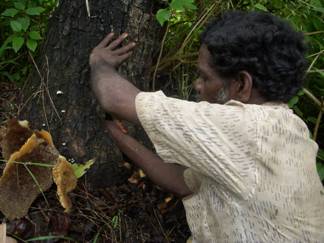Environment and Preservation

How did you learn to collect honey?
ICTA-UAB researchers have conducted a study to understand how learning strategies within a society change over the individual's life-cycle. This research has analyzed how honey collecting knowledge is transfered across generations in the Scheduled Tribe community of the Jenu Kuruba in south India. Among other results, we find that the most learning is done before age 20 and that children learn from their parents when they are young, but from other members of the community when they are older. Finally, this paper shows how to understand how cultural change occurs via these social learning strategies at different stages of the community members' of the life-cycles.
References
Kathryn Demps, Francisco Zorondo-Rodríguez, Claude García,Victoria Reyes-García. "Social learning across the life cycle: cultural knowledge acquisition for honey collection among the Jenu Kuruba, India" Evolution and Human Behavior. Volume 33, Issue 5, September 2012, Pages 460–470.
Cultural evolution theory predicts which social learning pathways we expect people to use, but much less often when—during a person's life cycle— different social learning pathways will be used. By measuring knowledge and skill variation between age cohorts, it is possible to infer how people socially acquire different types of knowledge at different ages.
We use this strategy among the Jenu Kuruba, a tribal community in South India. We document the accumulation of local knowledge required for collecting wild honey among children and adults from five communities. Combining measurements of knowledge with measures of four honey-collecting skills, we infer patterns of social learning across the lifecycle.
We find that (1) most knowledge related to honey collecting is acquired by the early 20s, and later social learning mainly functions to update information; (2) the eldest cohort has the highest average knowledge, although the most knowledgeable or skilled individuals are not always the elderly; (3) length of learning a skill can be affected by age; and (4) children tend to learn from parents when young, but from non-relatives later in life.
Accounting for age-dependent patterns of knowledge transmission is critical for understanding culture change in age-structured populations, such as humans have.
Victòria Reyes-García
Professora ICREA
Institute of Environmental Sciences and Technologies (ICTA)
2026 Universitat Autònoma de Barcelona
B.11870-2012 ISSN: 2014-6388
